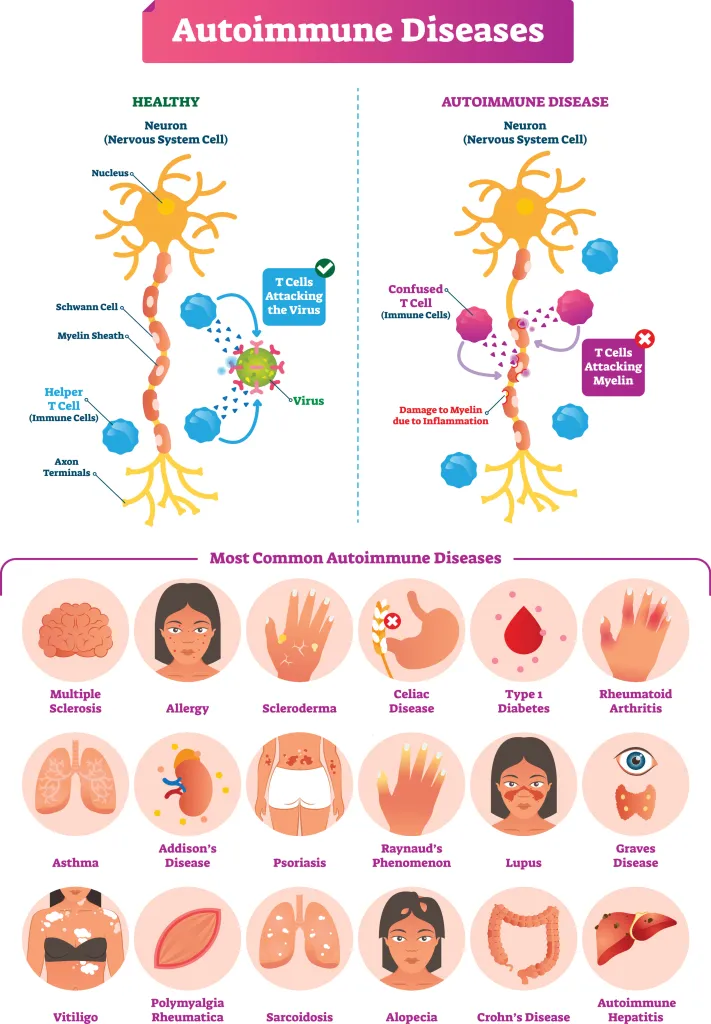Top Allergies And Autoimmune Disorders

Allergies and autoimmune disorders are becoming increasingly common in today’s society. An allergy is an overreaction of the immune system to a specific substance that is typically harmless to most people. This can range from mild symptoms such as sneezing and itching to severe reactions such as anaphylaxis.
Autoimmune disorders, on the other hand, occur when the immune system mistakenly attacks the body’s own tissues, leading to chronic inflammation and tissue damage.
Both allergies and autoimmune disorders can significantly impact one’s quality of life, causing a range of physical and emotional symptoms. They can also be challenging to diagnose and treat, as symptoms can vary widely from person to person.
In this article, we will explore the top allergies and autoimmune disorders, their causes and symptoms, and the available treatment options. We will also provide tips for managing these conditions and resources for support.
Key Takeaways
- Allergies and autoimmune disorders are increasingly common and can significantly impact quality of life.
- Identifying triggers and prevention strategies can help reduce the impact of allergies, while early detection and diagnosis is crucial for autoimmune disorders.
- Treatment options are available for managing symptoms and slowing progression, and lifestyle changes, stress-reducing techniques, and emotional support can also be helpful.
- Resources and advocacy services are available to help manage allergies and autoimmune disorders and access affordable treatment options.
Understanding Allergies: Causes and Symptoms
The understanding of allergies, including their causes and symptoms, is crucial for individuals to manage and alleviate their symptoms, as well as for medical professionals to provide effective treatment.
Allergies are a result of the immune systems hypersensitivity to foreign substances that are typically harmless to the body. When the immune system encounters an allergen, it produces an antibody called immunoglobulin E (IgE), which triggers the release of histamines and other chemicals that cause the typical allergy symptoms such as itching, swelling, hives, and anaphylaxis.
The most common allergens include pollen, dust mites, animal dander, certain foods such as nuts and shellfish, insect bites or stings, and certain medications.
Allergies can range from mild to severe, and symptoms can vary depending on the type of allergen and the individuals immune system response.
It is important for individuals who suspect they may have allergies to seek medical advice and undergo allergy testing to identify the specific allergen and develop an appropriate treatment plan.
Common Allergy Triggers and Prevention Strategies
Identifying common triggers and implementing effective prevention strategies can significantly reduce the impact of allergic reactions. Some of the most common allergens include pollen, dust mites, animal dander, and certain foods such as peanuts and shellfish. People who are allergic to these substances may experience a range of symptoms, from mild itching and sneezing to more severe reactions like anaphylaxis.
Preventing allergies requires a multi-faceted approach. This may include avoiding known allergens, using air purifiers and filters to reduce exposure to airborne allergens, and taking medication to control symptoms. In addition, some people find that dietary changes can be helpful in managing their allergies. For example, eliminating dairy or gluten from the diet may reduce inflammation and improve immune function, which can in turn reduce the severity of allergic reactions.
By taking a proactive approach to allergy prevention, individuals can minimize the impact of allergies on their daily lives and improve their overall health and well-being.
Mild vs. Severe Allergic Reactions: What to Look For
Distinguishing between mild and severe allergic reactions is important in determining appropriate treatment options. Mild allergic reactions usually involve symptoms such as itching, hives, and mild swelling, while severe allergic reactions can lead to anaphylaxis, a life-threatening condition. Anaphylaxis can cause difficulty breathing, a sudden drop in blood pressure, and loss of consciousness. It can occur within minutes to hours after exposure to an allergen and requires immediate medical attention.
To better understand the differences between mild and severe allergic reactions, the following table outlines common symptoms and treatment options for each type of reaction:
| Mild Allergic Reaction | Severe Allergic Reaction |
|---|---|
| Itching | Difficulty breathing |
| Hives | Sudden drop in blood pressure |
| Mild swelling | Loss of consciousness |
| Over-the-counter antihistamines | Epinephrine (EpiPen) |
| Avoidance of allergen | Emergency medical attention |
It is important to note that while mild allergic reactions may be less serious, they can still be uncomfortable and disruptive to daily life. Additionally, experiencing a mild allergic reaction may increase the likelihood of a more severe reaction in the future. Therefore, it is important to take all allergic reactions seriously and consult with a healthcare provider for appropriate management and treatment options.
Diagnosis and Treatment Options for Allergies
Diagnosing and treating allergies involves a range of options, which can be tailored to the individual’s specific symptoms and medical history.
The first step in diagnosing allergies is typically a physical exam, during which the doctor will ask about symptoms, family history, and potential allergen exposures.
In some cases, allergy testing may also be recommended to confirm a suspected allergy and identify specific allergens. Allergy testing can be done through a blood test, skin prick test, or patch test, depending on the type of allergy suspected and the individual’s medical history.
Once a diagnosis is made, treatment options for allergies include avoidance of allergens, medication, and immunotherapy.
Avoidance of allergens is the first line of defense and may involve lifestyle modifications, such as removing allergens from the home or workplace, or avoiding certain foods.
Medications, such as antihistamines, decongestants, and corticosteroids, can help alleviate symptoms and manage allergic reactions.
In cases where allergies are severe or not effectively managed by medication, immunotherapy, such as allergy shots or sublingual immunotherapy, may be recommended to help desensitize the immune system to specific allergens.
Ultimately, the best approach to managing allergies will depend on the individual’s specific symptoms and medical history, and may require a combination of different treatment options.
Recognizing Symptoms of Autoimmune Disorders
Autoimmune disorders can manifest in a wide range of symptoms, indicating the need for awareness and understanding of their potential impact on individuals’ health and well-being. These disorders occur when the immune system mistakenly attacks healthy cells and tissues in the body, leading to chronic inflammation and damage to various organs and systems.
Symptoms vary depending on the type of autoimmune disorder and the affected organs, but common ones include fatigue, joint pain, skin rashes, digestive problems, and neurological symptoms such as cognitive impairment, mood changes, and muscle weakness.
Recognizing these symptoms is crucial for early detection and proper diagnosis of autoimmune disorders, as many of them can mimic other conditions or have a slow onset. In some cases, people may have multiple autoimmune disorders that overlap or coexist, further complicating the diagnosis.
Therefore, healthcare providers need to take a thorough medical history, perform a physical exam, and order appropriate tests, such as blood tests, imaging studies, or biopsies, to confirm or rule out autoimmune disorders. Early detection and treatment can help manage symptoms, prevent complications, and improve quality of life for people living with autoimmune disorders.
Treatment Options for Autoimmune Disorders
Various treatment options are available to manage the symptoms and slow the progression of autoimmune disorders. The choice of treatment depends on the type and severity of the disorder, as well as individual factors such as age, overall health, and personal preferences. In general, the goal of treatment is to suppress the overactive immune response and reduce inflammation, which can help alleviate symptoms and prevent further damage to affected tissues and organs.
One common approach to treating autoimmune disorders is to use medications that suppress the immune system. These drugs can be effective in reducing inflammation and preventing tissue damage, but they can also increase the risk of infections and other side effects. Other treatment options include lifestyle changes such as a healthy diet and regular exercise, as well as alternative therapies like acupuncture and yoga. In some cases, surgery may be necessary to remove damaged tissues or repair organs that have been affected by the autoimmune response. Overall, the choice of treatment should be made in consultation with a healthcare professional who can help weigh the risks and benefits of each option and tailor a plan to the individual’s specific needs.
| Treatment Options | Pros | Cons |
|---|---|---|
| Immunosuppressive drugs | Effective in reducing inflammation and preventing tissue damage | Increased risk of infections and other side effects |
| Lifestyle changes | Can improve overall health and reduce inflammation | May not be sufficient for severe cases |
| Alternative therapies | Can be a complementary approach to traditional treatments | May not be supported by scientific evidence |
| Surgery | Can remove damaged tissues or repair organs | Invasive and carries risks of complications |
Living with Allergies and Autoimmune Disorders: Coping Strategies and Support Resources
Living with chronic immune-related conditions can be challenging, but there are coping strategies and support resources available to help individuals manage their symptoms and improve their quality of life.
One of the most important coping strategies is to adopt a healthy lifestyle. This includes eating a well-balanced diet, getting regular exercise, and avoiding smoking and excessive alcohol intake. Adopting stress-reducing techniques such as mindfulness meditation, yoga, or deep breathing exercises can also help to manage symptoms and improve overall well-being.
Additionally, it is important to have a support system in place, whether it be through family and friends, support groups, or counseling to help cope with the emotional and psychological impact of living with a chronic condition.
In addition to lifestyle changes and emotional support, there are also numerous resources available to help individuals manage their allergies and autoimmune disorders. These resources include educational materials, online forums, and support groups that provide information on the latest research, treatment options, and coping strategies. Many organizations also offer advocacy services to help individuals navigate the healthcare system and access affordable treatment options.
Overall, it is important for individuals living with allergies and autoimmune disorders to take an active role in managing their condition by adopting healthy habits, seeking emotional support, and utilizing the available resources to improve their quality of life.
Conclusion
Allergies and autoimmune disorders are prevalent health concerns that can significantly impact one’s quality of life. Understanding the causes and symptoms of these conditions is crucial in managing them effectively.
Common allergy triggers, such as pollen, dust, and certain foods, can be avoided or minimized through preventive measures and lifestyle changes. Mild allergic reactions, such as hives and itching, can often be managed with over-the-counter medications. However, severe allergic reactions, such as anaphylaxis, require immediate medical attention.
In contrast, autoimmune disorders result from the immune system attacking healthy cells in the body. Treatment options for autoimmune disorders, such as lupus and rheumatoid arthritis, involve managing symptoms with medication and lifestyle changes. Coping strategies and support resources can also help individuals with allergies and autoimmune disorders to manage their conditions and improve their quality of life.
Overall, early diagnosis, proper management, and ongoing care are essential to effectively manage allergies and autoimmune disorders and improve overall health outcomes.









